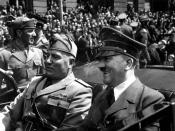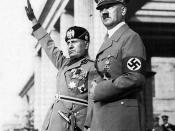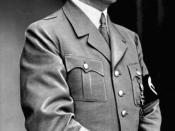Operational Command Is Something That Anyone Can Do--
an in-depth study of The Mask of Command
PART 5: Hitler
* * * "I have ordered to the East my Death's Head units with the order to kill without pity or mercy all men, women, and children...There is no time to lose. War must come in my lifetime." -Hitler * * *
Hitler was the self-proclaimed Supreme Commander of the entire Third Reich armies in the field by December 1941, and by that same token, according to Keegan's fourth chapter, was already falling from his own brave (or at least recognized via the Iron Cross First Class, for his heroic deeds) World War I beginnings to the epitome of the False Heroic. Although I thoroughly agreed with his assessment of Grant, and more or less with his analysis of Alexander the Great, his viewpoint on Hitler struck me as odd, to say the least--Keegan spent twenty pages outlining the pre-Brown Shirts beginnings of Adolf Hitler, and in some way, and I dare say accidentally, makes Hitler's World War I experience as a Corporal bounding from trench line to trench line as a Meldegänger (messenger) a justification for a platform that could have (should have?) excelled him into the limelight of any heroic title other than the disgraceful False Heroic.
Immediately following his glorification of Hitler's deeds in the List Regiment during WWI, Keegan offers a very well-thought out, and expressed linkage of Hitler's Western Front experience and his 'military exposure' to his overall strategy and stance during the opening days of World War II. "Hitler's survival...was not entirely haphazard...[H]e was a close student of the trench maps," and later he admits the first of his contradicting statements in regards to Hitler's ability to fulfill the role of Supreme Commander: "in...


